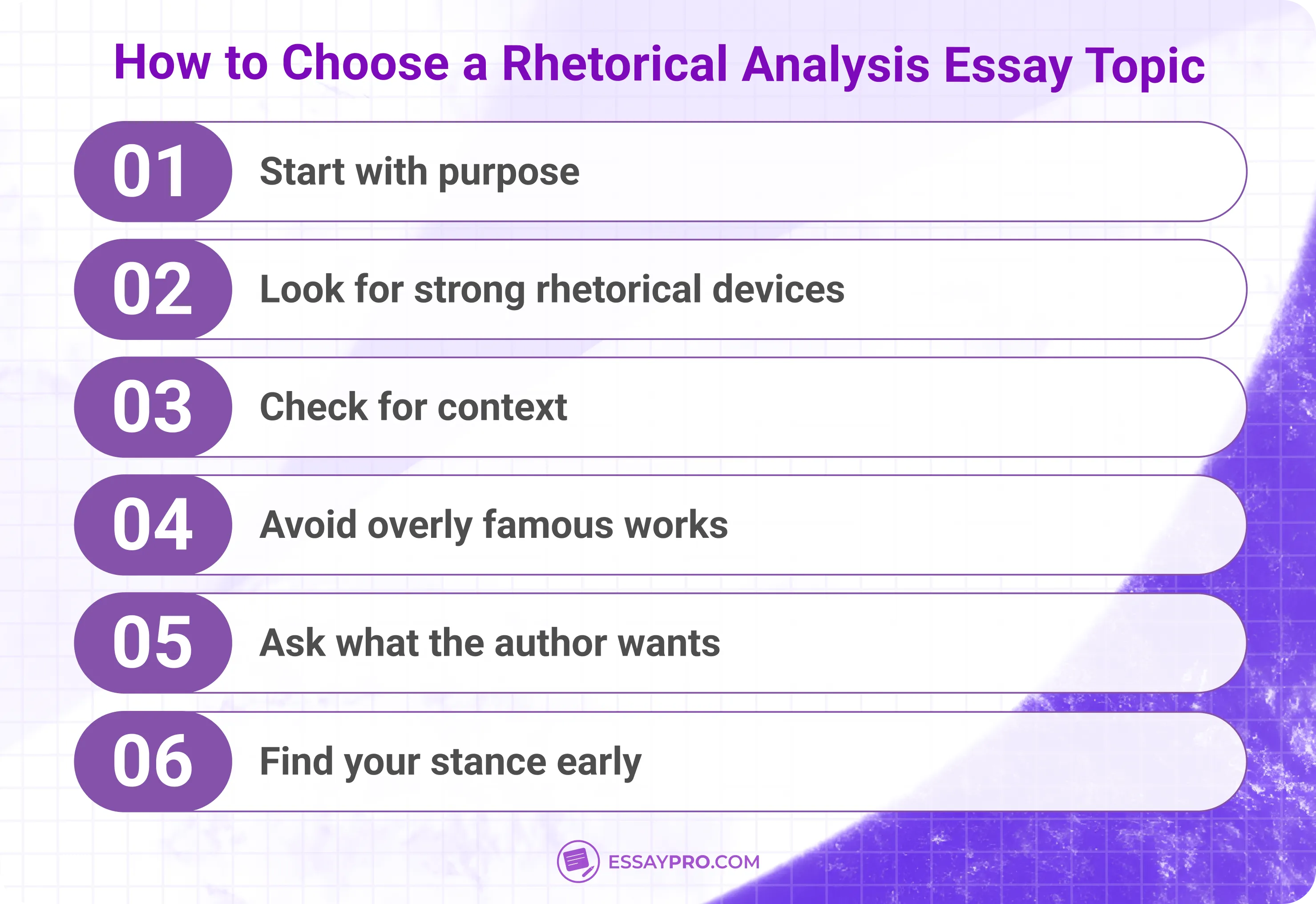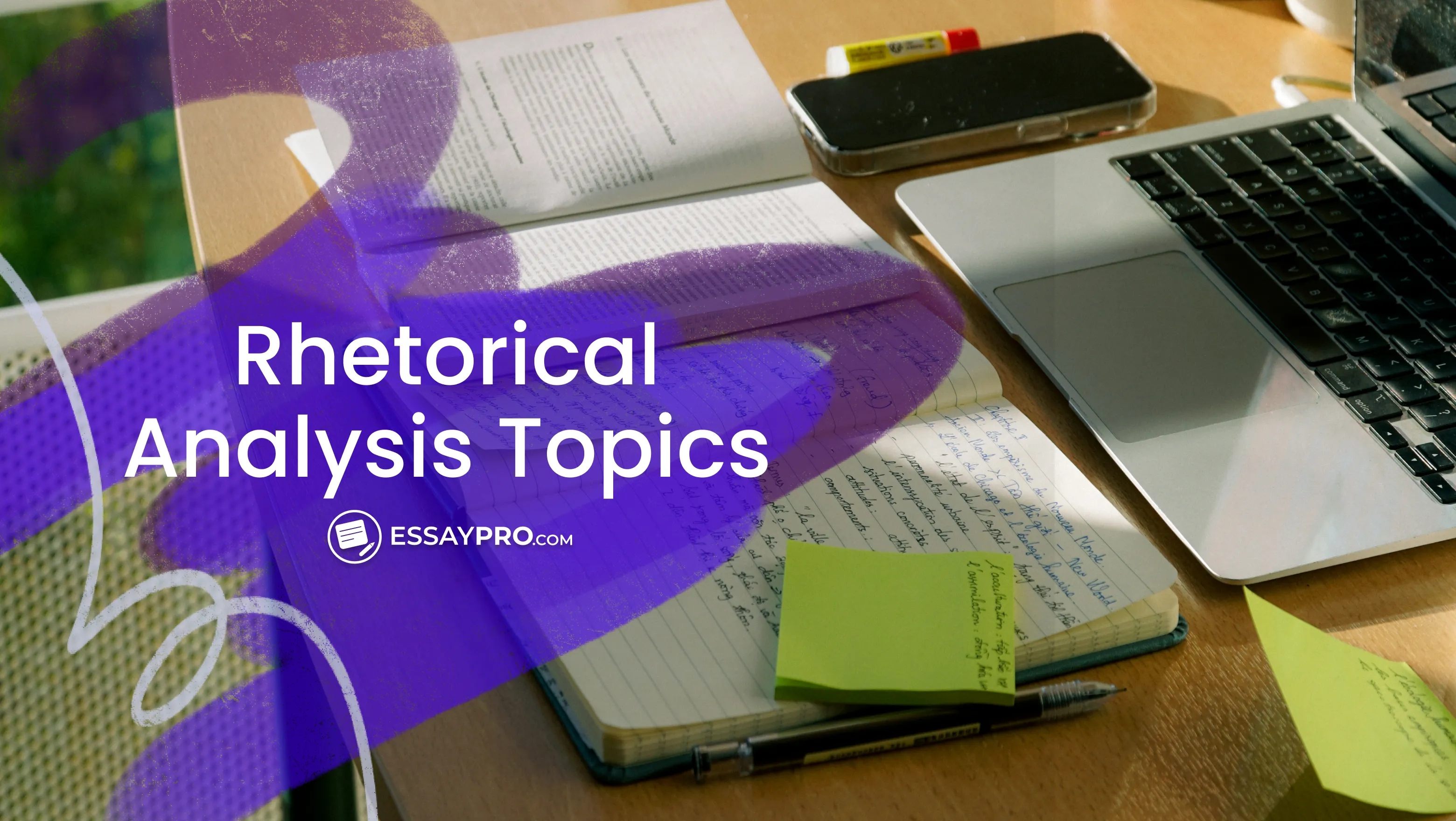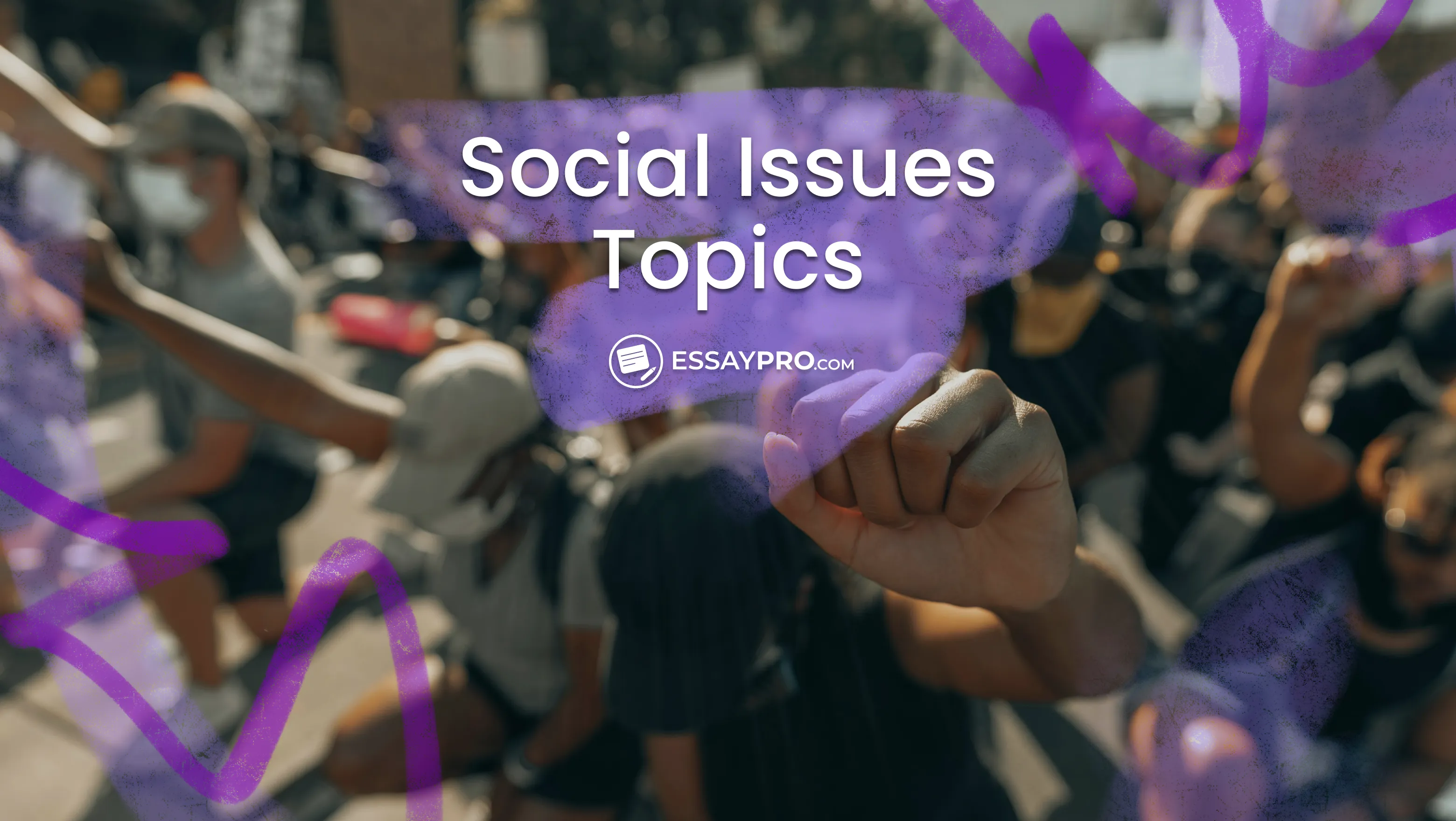A rhetorical analysis essay examines how writers, speakers, or even designers use language, visuals, and structure to persuade an audience. Students analyze tone, diction, imagery, and argument strategy.
Here are 5 best topics for rhetorical analysis essay:
- The language of apology in corporate crisis statements.
- Silence as a persuasive strategy in modern political speeches.
- The rhetoric of mental health awareness on social media.
- The emotional logic of climate change documentaries.
- How humor functions as defense in celebrity interviews.
This article walks through dozens of topics, from easy options for students to advanced ones across philosophy, politics, media, and more. EssayPro’s online services can help if you’re working on an assignment that needs expert guidance.


What are Characteristics of Good Rhetorical Analysis Essay Topics?
The best topics connect text, audience, and purpose in ways that reveal how language shapes thought. Here’s a quick table showing what makes rhetorical analysis essay topics effective:
Choosing a Rhetorical Analysis Essay Topic
When picking rhetorical analysis essay ideas, the goal is to find something that has clear persuasive techniques and a structured approach. Here’s a clear process to help you choose:

- Start with purpose: Decide what kind of ideas you want to work with, such as a speech, an ad, a song, or a piece of writing. Each one uses persuasion differently.
- Look for strong rhetorical devices: Choose a text that clearly uses ethos, pathos, or logos.
- Check for context: A topic with historical, political, or cultural relevance will always give you more material to discuss.
- Avoid overly analyzed works: Go for modern speeches, viral ads, or essays that still spark debate.
- Ask what the author wants: Good ideas start with intent. The clearer that intent, the easier your analysis will be.
- Find your stance early: Once you spot a text that stirs curiosity, note your first reaction. That instinct often becomes your main claim.
If you’re unsure where to begin, you can check this guide on how to start a rhetorical analysis essay for tips and examples.
Best Rhetorical Analysis Topics List
The best topics challenge your perception and make you pay attention to the way words, visuals, or tone are built. Below are examples that give you enough material to dissect meaning and effect.
- Political speeches that changed how people viewed freedom.
- Ad campaigns that shifted how the public thinks about climate change.
- Song lyrics that rely on repetition to stir emotion.
- TED Talks that mix personal stories with persuasion.
- Protest posters that evolved into lasting cultural symbols.
- Journal articles that use data and tone to shape trust.
- Social media campaigns that turned hashtags into movements.
- Graduation speeches that balance humor and sincerity.
- Movie scenes that rely on silence more than dialogue.
- Press releases that use language to manage controversy.
- Literary essays that manipulate tone to guide empathy.
- Government PSAs that use fear or hope as persuasion tools.
- Celebrity interviews that show rhetorical self-defense.
- Visual political cartoons that simplify complex issues.
- Documentary openings that establish authority within minutes.
Good Rhetorical Analysis Essay Topics
Below are effective topic examples that push you to look beyond surface meaning and find the craft behind persuasion.
- Political ads that frame opponents through word choice.
- Editorial cartoons that comment on social justice.
- University mission statements that sell an image of inclusivity.
- Brand slogans that rely on nostalgia to inspire loyalty.
- Campaign speeches that redefine patriotism.
- Public health posters that use emotion to influence behavior.
- Charity videos that use storytelling to drive donations.
- Satirical essays that critique political movements.
- Corporate emails that balance apology with reputation repair.
- Environmental campaigns that mix data with guilt or pride.
- Museum exhibits that use layout as a rhetorical tool.
- News headlines that manipulate urgency and attention.
- Podcasts that use pacing to guide emotion.
- Political debates where humor becomes strategy.
- Commercials that blur the line between empathy and manipulation.
Easy Rhetorical Analysis Essay Topics
Some topics are easier to approach because their techniques are clear and accessible. These ideas work well for beginners or short assignments where you can quickly identify rhetorical strategies without heavy research.
- Super Bowl commercials with obvious emotional appeal.
- Movie trailers that rely on suspense and tone.
- Graduation speeches that center on encouragement and self-belief.
- Social media ads that tap into trending culture to catch attention.
- Restaurant menus that guide choices through layout and language.
- Children’s book covers that guide young readers’ choices.
- Political memes that simplify complex arguments.
- Brand logos that carry hidden meaning.
- News broadcasts that balance calm tone with urgency.
- Celebrity apology videos that manage image recovery.
- Magazine covers that tell stories through composition.
- PSAs about recycling that guilt-trip audiences into action.
- Product packaging that promises values beyond the product.
- Streaming service ads that create fear of missing out.
- Influencer captions that use a casual tone to sell authenticity.
Visual Rhetorical Analysis Essay Topics
Visual rhetoric examines how images persuade through design and color. These topics invite you to decode how creators build meaning beyond words in art and media.
- Photography projects that capture social inequality.
- Album covers that capture feeling through visual design.
- Political cartoons that reflect public reactions to major events.
- Street art that turns everyday walls into social commentary.
- Brand logos that shift alongside changing cultural values.
- Billboards that hook viewers through witty or unexpected humor.
- Museum exhibits that guide interpretation through lighting and space.
- Social media infographics that make statistics emotionally charged.
- Film posters that hint at genre and tone through layout.
- Protest signs that merge art and activism.
- Government PSAs that use minimalism to evoke fear or hope.
- Video game designs that shape empathy through perspective.
- Corporate websites that use imagery to build trust.
- Environmental photography that evokes responsibility and awe.
- Fashion ads that turn diversity into a visual narrative.
Controversial Topics for Rhetorical Analysis
Controversial topics separate persuasion from bias in your analysis. Each of these topics still examines tone and framing, but they ask you to focus on language use in heated debates.
- Political speeches about gun control laws.
- Public reactions to climate change protests.
- News coverage of immigration policies.
- Campaign ads that use fear or pride to persuade.
- Social media arguments about the ‘cancel’ culture.
- Opinion pieces that debate reproductive rights.
- Government messages during health emergencies.
- Celebrities using activism to sway public opinion.
- Documentaries that influence how people see animal rights.
- Companies reacting to environmental criticism.
- School board meetings about banned books.
- Political discussions about income inequality.
- Protests that use performance as persuasion.
- Media portrayals of gender identity.
- Satirical pieces that mock political correctness.
Comparative Rhetorical Analysis Essay Topics
With comparative topics, you examine two sides of persuasion and analyze how the same issue sounds different when voiced in different formats and for different audiences. Choose one of these ideas to explore how strategy shifts depending on purpose and tone.
- Two political debates on healthcare reform.
- Slogans from competing tech companies.
- Speeches from different presidents at their inaugurations.
- News stories from rival outlets covering the same protest.
- TED Talks compared with university lectures on innovation.
- Reports from two global companies about sustainability.
- Charity campaigns that frame poverty differently.
- Film trailers for remakes compared to the originals.
- Political cartoons from different decades on the same issue.
- Public apologies from two companies after crises.
- Pro- and anti-vaccination PSAs.
- Essays by authors with opposing moral arguments.
- Documentaries on similar topics that take different stances.
- University mission statements with contrasting values.
- Two news anchors covering the same breaking story.
Personal Rhetorical Analysis Topics
Personal rhetorical analysis topics explore how persuasion appears in your daily life, including your habits and everyday choices. These ideas help you recognize how words and visuals influence thinking on a personal level.
- A song that changed how you viewed resilience.
- A teacher’s speech that still motivates you.
- A social media campaign that shaped your opinion.
- An ad that made you rethink what you value.
- A movie that altered how you see friendship or loyalty.
- A personal essay that revealed something about your beliefs.
- A brand’s message that unexpectedly resonated with you.
- A politician’s speech that earned or lost your trust.
- A podcast that reframed how you see failure.
- A sports commercial that sparked emotional connection.
- A YouTube video that taught persuasion through storytelling.
- A public statement that influenced your sense of ethics.
- A book that convinced you to take action in real life.
- A mentor’s advice that used rhetoric to guide your decisions.
- A viral video that changed how you understand influence.
If you ever need to reflect on how authors build a theme and shape perception, you can also check EssayPro’s custom book review writing service.
Rhetorical Analysis Essay Ideas for Students
Rhetorical analysis looks different at every stage of education, but the goal stays the same, and that is to see how technique turns into influence. We’ve grouped the following sections so that it’s easier to choose the right topic for your academic level.
Rhetorical Analysis Essay Topics for High School Students
High school students often analyze clear and relatable topics that are filled with visible persuasive techniques. These ideas let you practice spotting tone and structure in messages you see every day.
- Morning announcements that motivate or bore students.
- Posters at school that promote kindness or unity.
- Book reviews that persuade readers to love or hate a story.
- Song lyrics that use emotion to connect with listeners.
- TV commercials that rely on humor to sell products.
- Public speeches from student council campaigns.
- Social media challenges that push positive behavior.
- Movie scenes that use silence to create emotion.
- Teachers’ motivational talks before exams.
- PSAs shown in classrooms about safety or respect.
- School newsletters that use tone to build school spirit.
- Assembly speeches that inspire action or participation.
- Youth-focused magazine articles that frame success.
- Cartoons that teach moral lessons through humor.
- Nonprofit ads aimed at teenagers and school causes.
Rhetorical Analysis Topics for College Students
College-level rhetorical analysis looks at complex arguments and ethics. These topics invite analytical thought about culture, politics, and identity.
- Political speeches that appeal to logic over emotion.
- Editorial columns that shape public debate on climate change.
- Research articles that balance authority with accessibility.
- Campaign slogans that manipulate public identity.
- TED Talks that transform data into emotional stories.
- Nonprofit campaigns that use storytelling to drive donations.
- University marketing materials that sell belonging.
- Documentary narration that builds trust or skepticism.
- Corporate statements that reframe responsibility after scandals.
- Social justice ads that use visual contrast for impact.
- Academic essays that blend personal voice with authority.
- Movie reviews that sway audience expectations.
- Podcasts that change tone to reach different audiences.
- Opinion essays about AI ethics and accountability.
- Graduation speeches that use nostalgia to inspire hope.
Topics for Rhetorical Analysis Essay by Fields
Rhetorical techniques appear everywhere: in speeches, stories, ads, and even silence. When you look at them across different fields, you start noticing that what sounds inspiring in politics might feel manipulative in marketing, and what feels poetic in literature might sound persuasive in business. The sections below give topic ideas that reveal how rhetoric adapts to each world it touches.
Rhetorical Analysis Essay Ideas on Movies
Movies teach audiences how to feel and what to believe through sound and imagery. A rhetorical lens helps uncover how directors turn simple dialogue or camera angles into powerful emotional tools.
- Opening monologues that establish tone in classic films.
- Voiceovers that guide audience sympathy in dramas.
- Lighting choices that define moral alignment in thrillers.
- Action sequences that glorify or critique violence.
- Character costumes that suggest hidden motives.
- Film trailers that manipulate excitement through editing.
- Movie endings that rely on ambiguity to provoke thought.
- Soundtracks that shape emotional rhythm more than dialogue.
- Camera angles that create dominance or vulnerability.
- Comedy scenes that use timing as persuasion.
- Romantic films that redefine the idea of “happy endings.”
- Documentaries that blur the line between truth and narrative.
- Superhero movies that sell ideology through symbolism.
- Coming-of-age films that build empathy through realism.
- Animation that persuades through visual exaggeration.
Rhetorical Essay Topics on Literature
Every great piece of literature persuades in its own way through metaphor, rhythm, or narrative voice. Analyzing it rhetorically means exploring how language becomes power and emotion at the same time.
- Narrators who control readers through selective truth.
- Symbolism that transforms personal stories into universal ones.
- Dialogue that exposes hypocrisy or social hierarchy.
- Allegories that shape political or moral debates.
- Foreshadowing that manipulates readers’ expectations.
- Tone shifts that reveal hidden bias or irony.
- Poems that persuade through rhythm instead of argument.
- Novels that reflect social class through voice and diction.
- Metaphors that reframe human suffering into art.
- Imagery that converts abstract ideas into tangible feelings.
- Epistolary structures that build intimacy with readers.
- Satire that critiques power under the guise of humor.
- Epic tales that blend heroism with propaganda.
- Short stories that convince through brevity and omission.
- Literary essays that argue morality through character choices.
Rhetorical Analysis Topic Ideas on Media
Media persuasion works faster than reflection because it shapes perception before you notice. These topics help you develop a rhetorical analysis thesis statement that discusses how platforms and visuals define what people see as truth.
- Breaking news headlines that frame public panic or calm.
- TV anchors’ tone and body language during crises.
- Newspaper editorials that hide bias through word choice.
- Political podcasts that influence through tone and rhythm.
- Social media posts that use brevity as persuasion.
- Magazine layouts that blend entertainment with propaganda.
- Clickbait titles that manufacture urgency and fear.
- Talk shows that mix empathy and confrontation for effect.
- Hashtag campaigns that build identity communities.
- Fact-check articles that persuade by imitation of neutrality.
- Opinion pieces that use personal stories to sell ideology.
- Infographics that turn statistics into emotion.
- Media coverage of disasters that manipulates empathy.
- Radio shows that create authority through repetition.
- Celebrity interviews that construct or deconstruct public image.
Rhetorical Analysis Essay Topics Examples on Philosophy
Philosophy uses argument deliberately and precisely. Rhetorical analysis here means uncovering how thinkers convince through structure and metaphor more than proof.
- Plato’s dialogues and the illusion of balanced debate.
- Aristotle’s Rhetoric as both a philosophical text and a persuasion manual.
- Stoic texts that argue serenity through repetition.
- Nietzsche’s aphorisms as emotional persuasion.
- Kant’s moral imperatives as rhetorical performance.
- Existentialist essays that use ambiguity to compel introspection.
- Descartes’s tone of certainty as a rhetorical strategy.
- Feminist philosophers using lived experience as argument.
- Philosophical manifestos that mix logic with revolution.
- Wittgenstein’s use of paradox to reshape understanding.
- Postmodern writers who persuade through fragmentation.
- Eastern philosophy texts that persuade through metaphor and patience.
- Philosophical letters that balance emotion and intellect.
- Political philosophy that frames justice through narrative.
- Socratic questioning as rhetorical structure.
Rhetorical Analysis Essay Ideas on Culture
Culture speaks in aesthetics and trends, and persuasion lives in how people perform belonging or rebellion. These ideas invite you to study how culture persuades quietly, without saying a word.
- Fashion campaigns that sell identity instead of clothes.
- Music videos that celebrate or critique fame.
- Cultural festivals that preserve tradition through spectacle.
- TV sitcoms that reinforce or challenge family roles.
- Food documentaries that redefine authenticity.
- Online fan communities that create moral hierarchies.
- Museum exhibits that rewrite colonial narratives.
- Streetwear trends that merge rebellion with commerce.
- Celebrity interviews that shape generational values.
- Cultural memes that encode political commentary.
- Reality TV shows that sell relatability as truth.
- Travel vlogs that turn exploration into performance.
- Advertisements that turn diversity into marketing.
- Pop concerts that transform sound into social movement.
- Cultural awards shows that define “success” rhetorically.
Rhetorical Analysis Essay Topic Ideas on Business
In business, every word aims to convince, from ads to mission statements. These ideas reveal how rhetoric drives commerce.
- Startup pitch decks that sell vision more than product.
- Corporate mission statements that mask profit goals.
- CEO letters that rebuild trust after failure.
- Annual reports that persuade through optimism.
- Rebranding campaigns that rewrite company identity.
- Crisis communications that blend apology with control.
- Marketing slogans that promise belonging through purchase.
- Internal memos that motivate or manipulate teams.
- Sustainability claims that rely on selective truth.
- Customer testimonials that act as narrative marketing.
- Press conferences that use authority to manage image.
- Recruitment ads that sell purpose instead of salary.
- Investor presentations that rely on performance language.
- Emails that persuade under the guise of gratitude.
- Product packaging that markets ethics through design.
Rhetorical Analysis Topics on Society
Society persuades through repetition, including norms, policies, and media, all of which shape how people think about right and wrong. These topics help uncover how influence works at scale, in public and private spaces alike.
- Public speeches that redefine civic duty.
- Protests that communicate solidarity through symbolism.
- Government ads that reshape behavior for compliance.
- Social media trends that normalize activism.
- Educational policies framed as moral improvement.
- Public monuments that tell selective historical truths.
- Housing campaigns that shape perception of community.
- Charity events that mix empathy with performance.
- Health initiatives that persuade through fear or hope.
- Documentaries that redefine what progress means.
- Celebrity activism that blends influence with self-branding.
- Political rallies that use music and lighting to direct emotion.
- Opinion columns that shape national identity debates.
- Advertising that ties patriotism to consumption.
- Public art that invites reflection on inequality.
Final Thoughts
To write a rhetorical analysis look beneath the surface, using language and image for analysis. The topic largely determines the level of insight you gain while writing your paper.
If you ever feel stuck turning an idea into a complete essay, EssayPro is built for that gap. Real writers, not AI scripts, help students structure essays that read with depth and clarity. You can even buy a book report if you need to see how professional rhetorical analysis looks in practice.
FAQs
What Is a Good Topic for Rhetorical Analysis Essay?
A good topic offers clear rhetorical techniques to analyze, such as repetition, tone, structure, or visuals. For example, analyzing the emotional logic of climate change documentaries studies how imagery and narration combine to provoke guilt or urgency.
What Is the Best Topic for Rhetorical Analysis Essay?
The best topics strike a balance between familiarity and complexity. Choose one you already understand well enough to spot subtle choices. A political speech or a TED Talk often works because both rely on rhythm, imagery, and emotional appeal.
How Can I Choose a Rhetorical Analysis Topic?
Start with a piece that makes you feel a strong emotion, like admiration, curiosity, or even discomfort. Then ask why you felt that way. If you can identify word choice or structure as the reason, you’ve found material worth analyzing.

Mariam Navrozashvili
She has a Master’s degree in English Literature and brings a deep understanding of storytelling, critical analysis, and language structure to her work. On EssayPro Blog Mariam writes guides on literary analysis, essay composition and language studies to help students improve their writing skills. In her free time she likes to read classic novels and discuss literary theory.
- Valencia College Library. Rhetorical Analysis Essay Model. Retrieved from https://valencia.unm.edu/library/class-resources/essay-models/rhetorical.html
- University of Illinois Writers Workshop. Rhetorical Analysis. Retrieved from https://writersworkshop.illinois.edu/resources-2/writer-resources/academic-writing/rhetorical-analysis/
- Kennesaw State University Writing Center. Rhetorical Analysis Resources. Retrieved from https://campus.kennesaw.edu/current-students/academics/writing-center/resources/rhetorical-analysis.php







